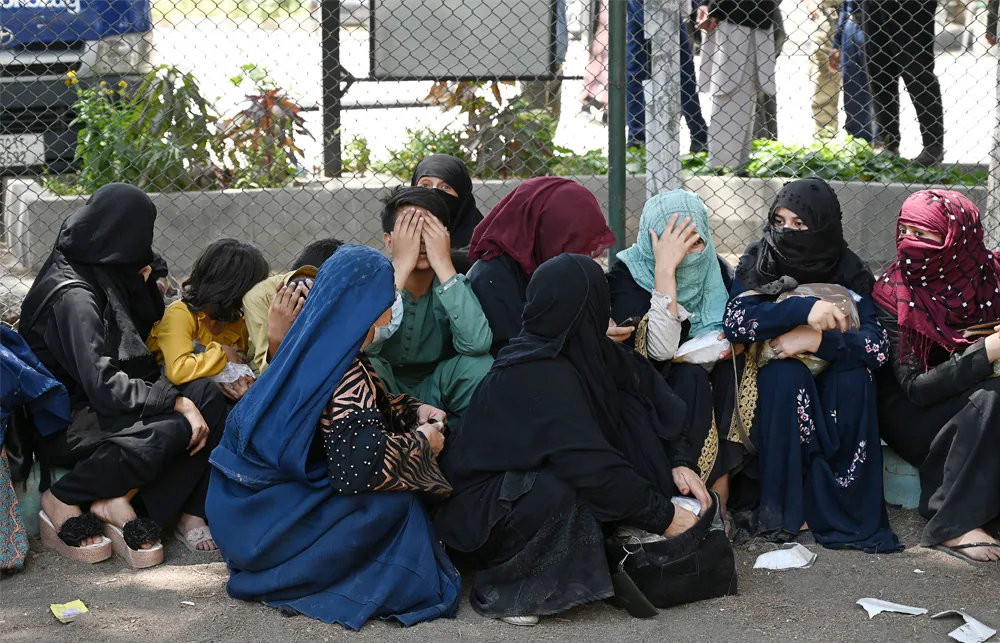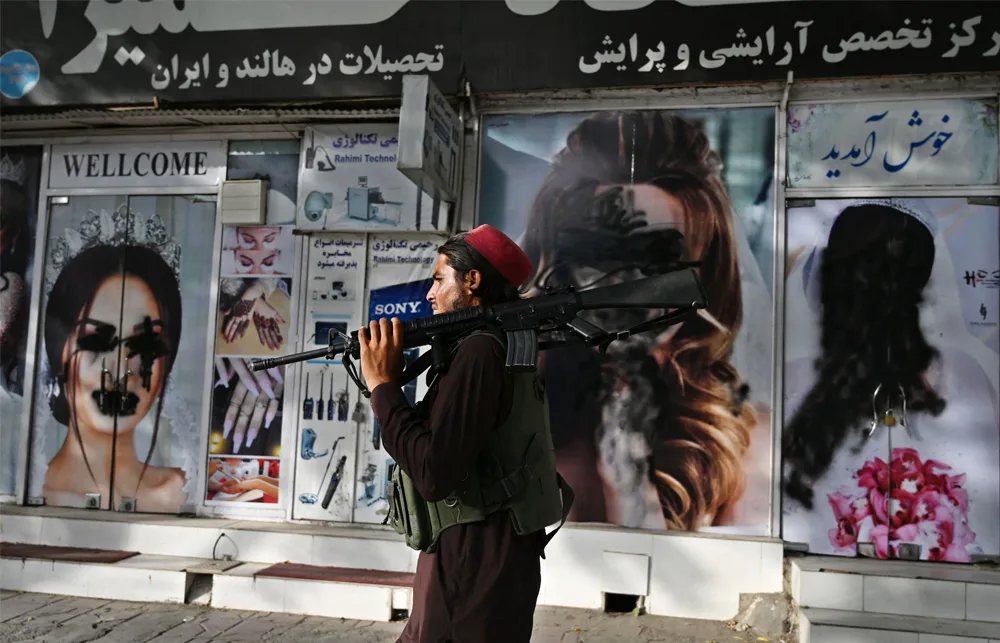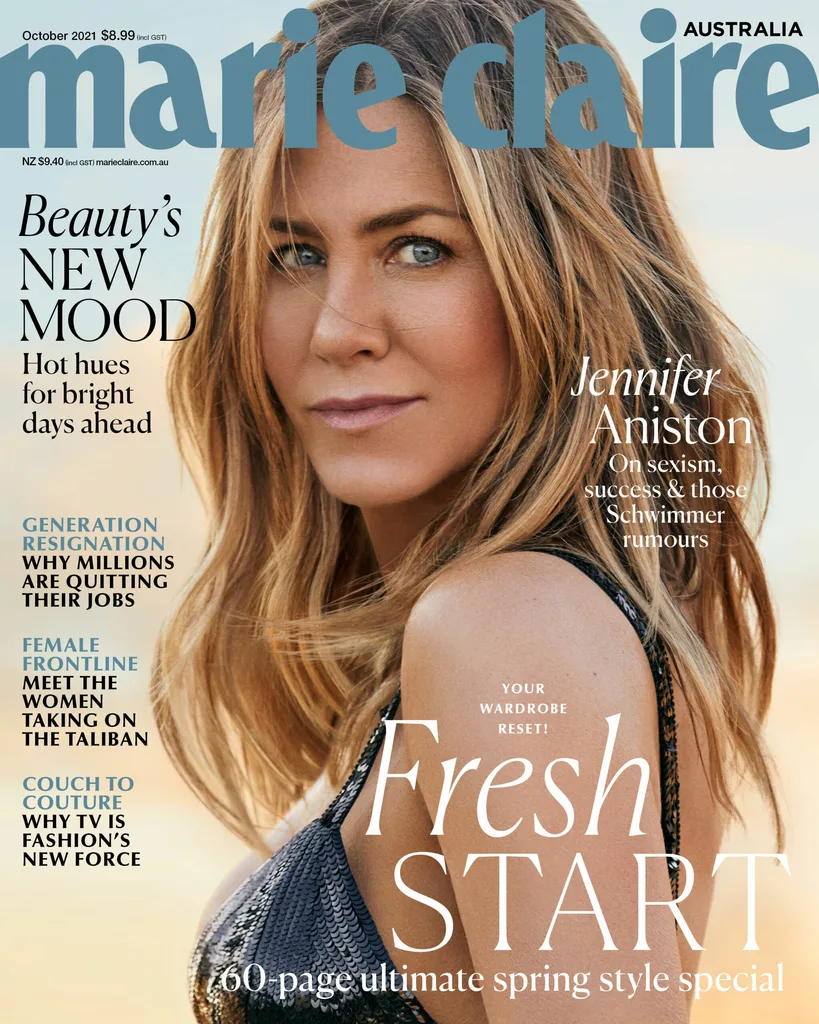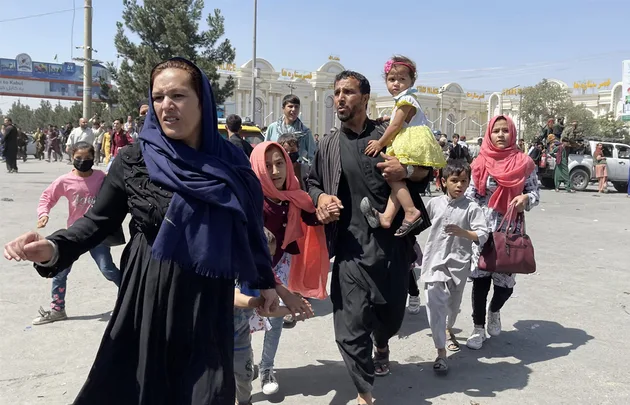In August, the world watched on in horror as the Taliban seized Afghanistan, collapsing 20 years of a US-led mission to protect the country and sparking a humanitarian emergency. Under Taliban rule, women’s safety and rights are under grave threat, and those unable to escape are fearful of their future. Three women caught in the crisis tell their stories to Sarah Ayoub.
ZARSANGA SAYYID *, 24
Zarsanga was based in Kabul, working in finance and living in a dormitory with two other women. She fled to the airport the day the Taliban conquered Kabul and, following a harrowing ordeal, she managed to get onto an evacuating flight. While she is now safe in an undisclosed location, she is still fearful for her life.
“I spent six years working with foreign officials and knew I would be killed if the Taliban returned to power, so the contractors I’d been working with decided that I should be taken out of Afghanistan as soon as possible.
I booked a ticket for Islamabad, as my family are all living there – they left Afghanistan a year ago. But on the day I was due to fly out, my airline told me that my flight had been cancelled. The next day, the Taliban started going door to door. I didn’t open mine and told them to leave, but they shouted at me, saying I should not be living without a mahram – an immediate male relative – because girls who live alone aren’t of good character. I called my contractor, who told me to immediately leave that apartment.
I put my laptop, a packet of biscuits and a bottle of water in a backpack and ran away. I didn’t even pack any clothes or say goodbye to anyone. It took so long to reach the airport because the roads were so crowded with people trying to get there. I had to pass a Taliban checkpoint on the way, and they kept telling me to go home, but I was begging them to let me pass. They hit me with the backs of their AK-47s so that I would move away, but another soldier let me go.
It took about six hours to cross another checkpoint and get into the airport. The Taliban soldiers there used a bull whip on me because they didn’t want to touch women, but they were punching and hitting men. There were about 10,000 people sitting with their heads bent down, and as soon as the Taliban soldiers left that checkpoint, they literally rushed forward, stepping all over me. One of the gates was blocked by a shipping container, and we had to climb it and then jump to the other side. Before I got a chance to do that, somebody pushed me and I landed flat on my face.
I became unconscious then woke up to a Taliban soldier telling me to go home, but I knew that the Taliban were taking girls in the provinces and I didn’t want to risk losing a spot at the airport. I had nowhere to go anyway. I just pushed forward. We waited there from midnight until 2pm the next day, standing on our feet without food or water. The worst part of that time was how many men harassed me. They touched me inappropriately all over my body. I was crying so much, I don’t even want to think about that day again.
By the morning, there were about 15,000 people there, most undocumented. I spent another 12 hours standing in a big queue inside the airport. I finally got onto an army plane, but I was so weak I couldn’t even tell which country it belonged to. I found out later it belonged to an organisation called No One Left Behind [a US non-profit that assists Afghan allies].
The soldiers at the airport were so nice to us – US soldiers, British, Arab. It felt like everything was under control and they were really protecting us. On the plane, no-one even knew where we were going. I assumed Qatar, Iraq or Uganda, but I ended up somewhere else. When I landed, the people were so nice to me. They checked my blood pressure, heartbeat and oxygen levels. They gave me water and food – it was the first time I’d eaten in three days.
I come from a province that had always been under Taliban control, and many risked our lives to study. An Afghan woman graduates from school as if she is a warrior. If it was worth risking our lives just to be able to read a book, just to be able to write something, then it should be visible to everyone how important education is to us. We don’t belong in the Stone Age. We belong to the world, and we have the same brains as other women. We just never had good resources.
When I saw the picture of the man painting over the [ad featuring a] woman, I realised there would be no more women ever coming out of their homes. I feel so abandoned, because our country was taken from the Taliban then given back to them, and the other armies who supported them are also involved in destroying the future of millions of Afghans. We had been working on our country, our future, for 20 years, and everything got destroyed in days.
We are disgusted, hopeless and completely destroyed. But I will not lose hope for myself. I will try my best to make a better life for me and my family, and to make my country proud.”
*Not her real name.

YALDA HAKIM, 38
When she was six months old, Yalda Hakim’s parents smuggled her and her two siblings out of Afghanistan on horseback in the middle of the night. In 1983, they settled in Sydney, where Hakim grew up. In 2008, she travelled back to Afghanistan as a journalist for the SBS program Dateline and established contacts that would inform her work for years to come. Now based in London working for the BBC, Hakim interviewed the Taliban in Afghanistan just weeks before their takeover. Following the fall of Kabul, she received a call from Taliban spokesman Suhail Shaheen while live on air.
“Afghanistan is the country of my birth, and although I was raised in Australia, I have a very deep and personal connection with the country. I’ve gone back to Kabul many times over the past 15 years and really seen the country and its people evolve. They’ve become independent people with their own careers and aspirations and dreams, and those have not been different from the aspirations and dreams we all have. I was last there in July, and the situation was getting very tense. There was a sense that things were getting worse and freedoms were being taken away. At first it was things like not being able to go to restaurants, then it was not being able to leave the compound, then not even being able to walk around the streets at all.
I still maintain a lot of connections with people on the ground there. To watch on helplessly and be unable to do anything about it has been difficult personally and professionally. I am trying to use my platform to make sure the voices of the people in this very human tragedy are not lost or forgotten.There’s something about Afghans – a resilience, a sort or sarcastic and dark humour in spite of everything they’ve been through – because they know that laughing is the only way to survive tragedy after tragedy.
One very famous news anchor in Kabul recently made it to New York City where she is now waiting tables. She’s miserable, because she feels like she is no longer herself. She has lost everything, because everything she stands for is in Kabul. She’s just one of many women I am getting messages from right now, and the sentiment is the same: this fear, and this idea that they don’t know who they are anymore. It’s really tragic when you think about how the Western world said to them ‘join us in this project and we will give you human rights, shelter you, support you, finance you’, and now they can’t even draw their curtains at home because they might see an insurgent waiting with a gun outside their window.
I was midway through a live interview on my program when a Taliban spokesperson called me live on air. We had been texting while they were at the gates of Kabul, and I remember thinking [I should answer] because this is the group that the rest of the world wants answers from. I told him we were live on BBC News and he was clearly prepared to answer my questions.
There’s a desperation for legitimacy among the Taliban right now. They want to say they are reformed but the evidence we’re seeing on the ground says something very different. The Taliban are Islamist militants who are bloodthirsty for these people who believed in the Western world.
The Afghans I speak to are overwhelmed with utter betrayal and abandonment. There’s so much sadness and helplessness among them. I don’t think that will ever leave me, much like the fact that I don’t think anyone will ever forget the images of people plunging to their deaths because there was more hope in being whisked away on the outside of a plane than staying where they were. An Afghan Pulitzer Prize-winning photographer told me that it was like they were allowed to live for 20 years and now they have to return to the darkness, where they will once again be forgotten. There’s a sentiment of fear, of loss of their nation, of heartbreak. There is so much lost, so much potential gone.”

PASHTANA DURRANI, 24
Pashtana Durrani is the executive director of Learn, a non-profit focused on ensuring women and girls have access to education in Afghanistan. When the Taliban took control, Durrani and her family fled their home in Kandahar, the country’s second-largest city, and are now in hiding. However, she is adamant that she won’t abandon the girls she teaches.
“By the time I was able to walk, the Taliban were already out of the country [the Taliban previously had control of Afghanistan from 1996- 2001]. But I know the stories of what it was like back then. It was very dark. Women have been through so much trauma and suffering. The minute they took Kandahar, we knew they would take over Kabul. We knew it would just be a matter of days. So when they took over Kandahar, I was sure that Afghanistan was gone. It was an emotional time for me. I cried my eyes out. And my family, we didn’t know what to do, what not to do, who to talk to.
I used to wake up every morning in Kandahar and go for a walk, go to work, see my friends and study in the evenings. Now, I don’t leave the house. Half my university friends have fled the country. They are heading for a better life somewhere else, somewhere they can be free. I don’t blame them but I am staying here. I miss the freedom of just going outside. But there are different kinds of freedom, and the one that is most important to me right now is the education of Afghan girls. I can’t turn my back on them.
My focus is on protecting our basic rights such as education – because we have earned it. My organisation, Learn, works with girls who live in places where they don’t have schools or infrastructure. A lot of rural girls have been abandoned in the past. We try to get them a good general education and STEM education focusing on biophysics, chemistry and technology. At the same time, we give our girls training in things like menstrual hygiene management.
We have an offline app where we offer courses. The materials can be accessed via tablet, which we give them. It makes me concerned about all the progress we have made and good things that we have done so far. All these girls, they have a lot of ambitions. They just want to be seen. They want to be heard. They want to take up the public spaces. And that should be the case.
If it was about me, only me, I could have moved to any of the neighbouring countries, continued with my studies, and be done with it. But, then again, there are at least 7000 girls who don’t have that opportunity. I have an international platform right now and I can be a voice for them. They don’t have internet. They don’t have electricity. They don’t have the access to international media. I have all that, so why not talk about it? It’s my responsibility. It’s my country. [Education] is the one thing that I’m willing to put up a fight for … I’m going to make sure that girls can access their rights one way or the other. If they cannot do it legally,we are going to find a way, and we are going to stand by each other in solidarity.
Am I worried what the future holds? Yes. If people ask me, ‘Are you afraid?’ Come on, I’m not afraid. I was born in Afghanistan. We have been fighting since the day I was born, so get over it, fight it, right? All these men have been in charge for centuries and they haven’t made very good decisions. I think it’s time we claim our space. We need to come together to make sure that the next generation doesn’t have to worry. We all have to choose our own battles. This is mine. I’ll raise an army, just like they did – except that mine will be of educated, determined Afghan women.
What gives me hope is that I know there will be other women like me feeling the same way. I am torn about whether staying is the right thing to do. But I really want to stick this out. When I think about the future of my country, I think of a girl like me. I want her to have more influence, more opportunities, a better life. I don’t want her to live in fear of the Taliban. So I have to keep going – if not for me, then for her.
This story originally appeared in the October issue of marie claire Australia, out now.











